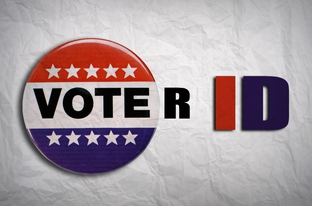Voter ID Mudslinging Continues

The U.S. Department of Justice is keeping Texans guessing as to whether they will have to furnish photo IDs before casting their ballots. But a fresh lawsuit has spurred a new round of mudslinging directed at the law's Republican backers.
Texas Attorney General Greg Abbott on Monday filed suit against DOJ and U.S. Attorney General Eric Holder in hopes that a federal court will put Texas’ voter ID law, written by Sen. Troy Fraser, R-Horseshoe Bay, into effect. The measure has been stuck since July. Under Section 5 of the Voting Rights Act, the federal government reviews laws that affect voters and elections, and the state and DOJ have been tussling for months over whether Texas has supplied adequate information to prove that the measure won’t disenfranchise elderly and minority voters.
The feds want information about an estimated 605,500 Texas voters who do not have a state-issued license or ID, and about how many of them have Spanish surnames. The same information was requested for registered voters who have valid IDs.
Federal review under the Voting Rights Act can come either from the DOJ or from the federal district courts in Washington; since DOJ isn't moving, the state is trying to move the Voter ID review to the courts.
“The U.S. Supreme Court has already ruled that voter identification laws are constitutional,” Abbott said in a statement. “Texas should be allowed the same authority other states have to protect the integrity of elections. To fast-track that authority, Texas is taking legal action in a D.C. Court seeking approval of its voter identification law.”
The move prompted a swift response from Rep. Trey Martinez-Fischer, D-San Antonio, the outspoken leader of the Mexican American Legislative Caucus. And he went ahead and threw a not-so-subtle jab at Gov. Rick Perry, who deemed the measure an emergency item last year.
“I am happy to know General Abbott is learning from his mistakes in redistricting and is pursuing a dual track preclearance submission. I am disappointed, however, that he has adopted in his complaint the persona of a tough-talking Texan making back-handed threats to federal judges in Washington, D.C.,” Martinez said. “I will remind General Abbott that Texas arrogance didn't play well on the national stage and it is my guess there is only so much bigotry federal judges will tolerate from an Attorney General who tries his cases with press releases.”
Added Steven Maxwell, the chairman of the Tarrant County Democratic Party: “Texas Republicans have skipped preclearance procedures (mandated by the Voting Rights Act) of their Voter ID law with the Department of Justice. While this is legal, they are doing so because they know it is very unlikely the DOJ will allow this law with its resulting voter suppression in Texas.”
At least one Democrat, though short of endorsing the lawsuit, said it could backfire on the GOP. Sen. Rodney Ellis, D-Houston, said the action could actually prompt a faster rejection of the law.
“It's … essential that any change to our elections, especially one that will disproportionately affect minority and poor voters, receive the appropriate review from the Department of Justice. I believe any litigation to speed up that decision will only result in its quicker rejection,” he said in a statement.
Meanwhile. Lt. Gov. David Dewhurst issued a defense of Abbott’s actions, saying that "the only thing that Texas' voter ID law seeks to suppress is illegal voting, and Texas has a Constitutional responsibility to defend the rights of millions of law-abiding voters by ensuring fair elections in our state."
The Department of Justice has until March to issue a ruling on the state’s law.

